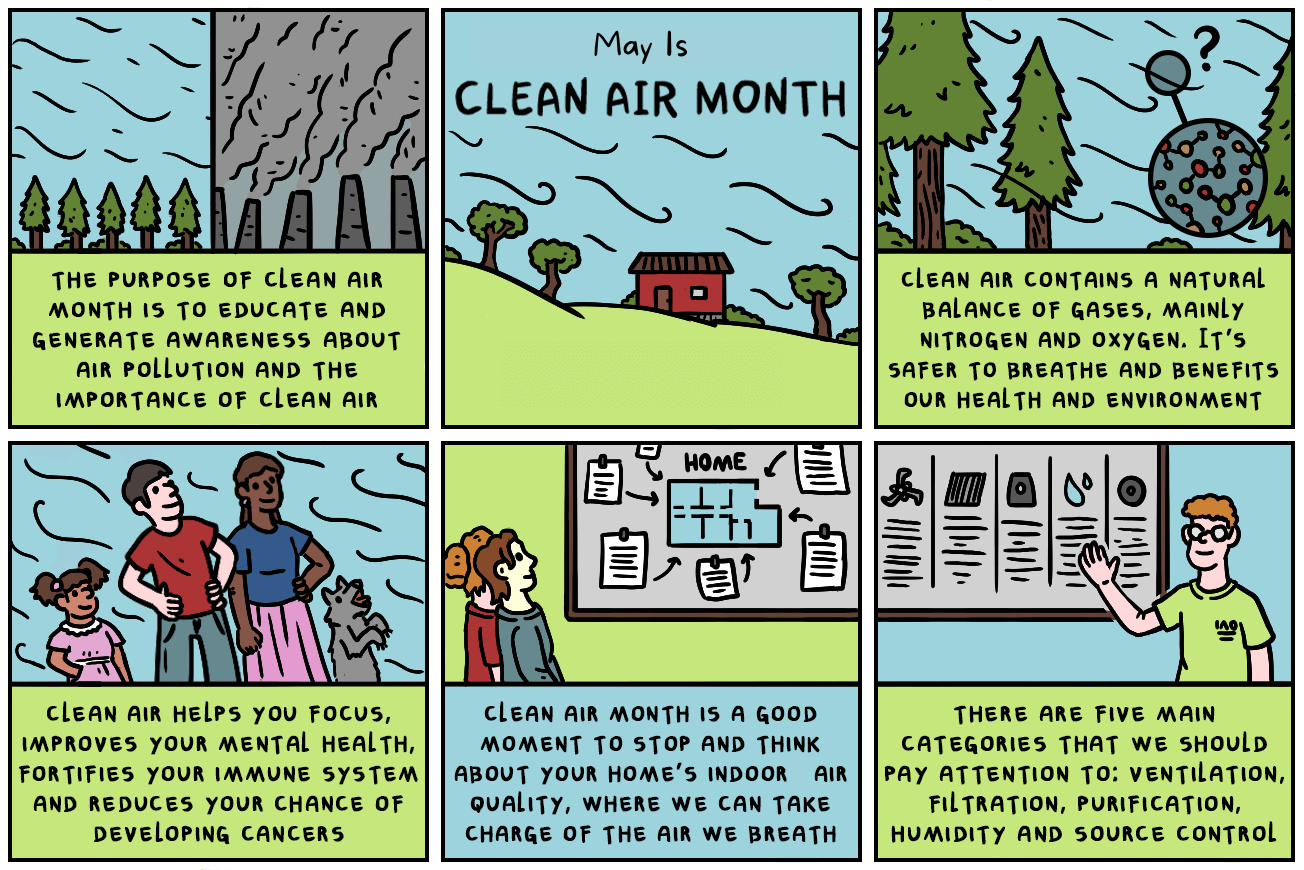There are plenty of reasons to love the month of May. Here in the northern hemisphere, it marks the period between spring and summer when flowers are blooming and the weather is warm. May also features a multitude of awareness and celebration days, including Clean Air Month.
What Is Clean Air Month?
The purpose of Clean Air Month is to generate awareness about air pollution, the importance of clean air, the relationship between air quality and respiratory health and how to improve air quality. The American Lung Association (ALA) first organized a clean air observance week in 1972. It evolved into a full education month in 1994.
ALA was one of the first organizations to discuss the connection between air pollution and lung health. As an organization, its goal is to help prevent lung diseases, improve lung health for all and ultimately save lives. The first clean air week occurred two years after the passage of the Clean Air Act in the United States. A monumental piece of environmental legislation, this awareness month is a time to recognize the achievements of the Act and how air quality has improved over the past 50 years thanks to regulations.
However, Clean Air Month also serves as a time to acknowledge that poor air quality is still a very present issue today and that greater public awareness will lead to action, intervention and a healthier society.
Clean Air
More than likely, you know what a full breath of clean, fresh air feels like. Or perhaps, what it smells like. Our personal clean air associations might differ person-to-person, but the bottom line is that clean air is truly noticeable.
What actually comprises clean air? Clean air contains a natural balance of gases, primarily made up of nitrogen and oxygen and is without harmful levels of pollutants or contaminants. Clean air is safe to breathe and actually benefits our health and the environment.
Researchers have even identified the cleanest air on Earth. Spoiler: it’s a region of the Southern Ocean, near Antarctica. The air is free of particles and pollutants caused by human activity and industry. By contrast, polluted air is tainted by the release of contaminants. Air pollution threatens both human health and the surrounding environment.

What Difference Does Healthy Air Quality Make?
Air pollution is deemed a critical threat because of the numerous human health risks and significant environmental consequences that air pollution presents. Let’s break down the benefits of clean air and some of the surprising ways the air we breathe matters.
For Human Health
The list of health issues, conditions, diseases and cancers that air pollution causes or contributes to seems never-ending. It ranges from more minimal symptoms like a sore throat or a cough to serious symptoms like shortness of breath and high blood pressure. Poor air quality has also been linked to difficulty concentrating and poor sleep quality. Serious air pollution exposure, whether indoors or out, can lead to cancer and even premature death. It’s no wonder experts are endlessly advocating for better air quality.
Let’s look at the health benefits of clean air:
- Healthy lungs
- Mood booster and improved mental health
- Reduced chances of developing serious life-threatening diseases, cancers and conditions
- Fewer respiratory symptoms for allergy and asthma sufferers
- Improved concentration and mental focus
- Stronger immune system
- Increased energy
- Lower blood pressure and heart rate
For Environmental Health
Environmental health is a part of public health focused on addressing and mitigating the environmental factors that impact human health. This does not solely mean nature and weather. It applies to the entirety of our surrounding environments. That means things like plants and infrastructure in our local climate as well as the building materials used in our home. There is a wide range of environmental factors, and clean air is a vital component of good environmental health. This is also where indoor air quality becomes a focus. Improved indoor environmental health and mitigation of indoor pollution sources require active intervention.
For Climate Health
Some sources of poor air quality also contribute to climate change. For example, burning fossil fuels is a source of air pollution that impacts both your health and the Earth. Climate change is an air quality matter because it is a cyclical issue. Sources of air pollution contribute to climate change and climate change, in turn, worsens air quality.
Ensuring Clean Air
So, cleaner air is crucial for many reasons. But what can you do to ensure cleaner breathing air?
Advocate for Healthier Air Everywhere
This month offers the perfect opportunity to advocate for healthier, cleaner air—indoors and out. This can take many forms. Maybe it means stressing the need for HVAC maintenance or system upgrades to your employer or supporting IAQ control methods in your child’s classroom. Or even researching air quality in your local area and finding out how your city addresses air pollution.
Improve Your Space’s Indoor Air Quality
As the homeowner’s advocate, we focus on indoor air quality control solutions in the home because it is usually the one and only place where you personally can take charge of the air you breathe. For decades, the importance of indoor air quality has gone overlooked. Taking action can be as simple as choosing to start intervening in your own indoor space. IAQ control solutions fall into five main categories: ventilation, filtration, purification, humidity control and source control.
 IAQ Control Solutions: Interested in learning more about the five IAQ control strategies? Our in-depth guide is available here →
IAQ Control Solutions: Interested in learning more about the five IAQ control strategies? Our in-depth guide is available here →There is no one set way to go about improving IAQ. We suggest determining what the top air quality issues in your space are first. But, more than anything, we suggest starting.
Healthy Indoor Air
At IAQ Works, we may hone in on indoor air quality, but we certainly do not neglect how crucial air quality is as a whole. And, of course, the direct relationship between outdoor air quality and indoor air quality. The potential health consequences and quality of life impacts are largely the same, even if the pollution sources differ. Air quality concerns are indoor air quality concerns. Clean air outdoors benefits clean air indoors. And clean air is possible in your home.



